|
Texas Rat Snake
|
- Order: Squamata (scaled reptiles)
- Suborder: Serpentes (snakes)
- Family: Colubridae ("typical" snakes)
- Subfamily: Colubrinae ("typical"
snakes)
- Genus: Elaphe (corn, fox, and rat
snakes)
|
| Also Known As: chicken
snake (for its affinity with chicken coops, where it may prey on
chicks as well as rodents) |
Scientific Name: Elaphe obsoleta
lindheimerii (Baird & Girard, 1853) |
| Habitat: A wide range;
from forests to arid lands, often around human habitation, to
where it is attracted by the presence of rodents. |
Elaphos="deer" (possibly alluding
to these snakes' speed), obsoleta="faded," lindheimeri
in honor of Ferdinand J. Lindheimer who collected the first
specimen
|
| Length: Up to
approximately 8 feet. |
|
| Food: Rodents, birds,
and lizards. |
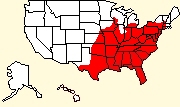 |
|
I have found MANY of these snakes, primarily
through my work with my herp
club's Reptile Rescue program. People often call for us
to come get a "rattlesnake" out of their yard/garage,
and these are what they turn out to be. To the casual
observer, I suppose they can be easily mistaken for rattlesnakes,
due both to appearance and behavior. |
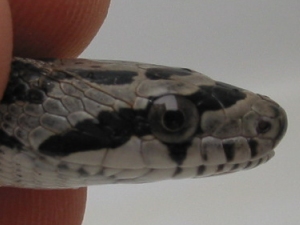 |
| These pictures are of juvenile
rat snakes. I have found them in and around houses, probably
feeding on the plentiful anoles and geckos
found around neighborhoods here in San Antonio. Notice the
blotched pattern. This pattern usually fades as the snakes
grow, with the adults possessing only drab blotches. The
blotched pattern is what causes people to think they have found a western
diamondback rattlesnake. |
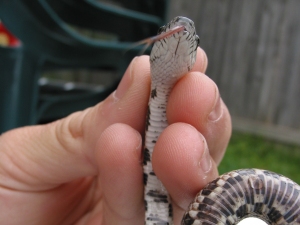 |
|
Not only do these snakes get big and look
mean, but they act mean as well. Even a small Texas
rat snake will not hesitate to bite. Usually this is
prefaced by appropriate warnings, such as rearing up the front
third of the body (like a rattler), inflating that part of the
body to look more imposing, and even rattling the tail (like a
rattler, but unless it's rattling on a bed of dry leaves, it
doesn't make any noise). |
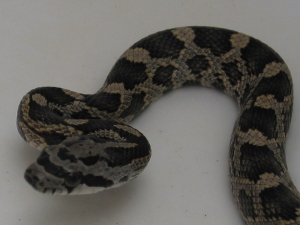 |
| This picture is of a 5-foot
female captured in San Antonio as a nuisance snake. It was
relocated to farmland and released. |
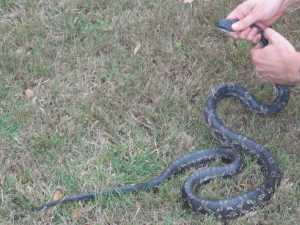 |
|
These next two pictures were sent to me by a
friend. They were taken by Beaux Graham of Cedar Creek,
Texas. The picture at right shows two Texas rats
infiltrating a chicken coop. |
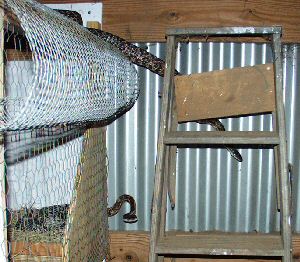 |
| Finally, here's a picture of how
the "chicken snake" got its name. It's hard to
tell which is more surprised--the chicken or the snake! |
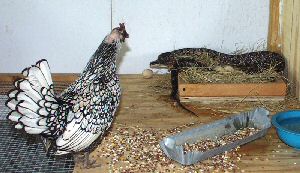 |